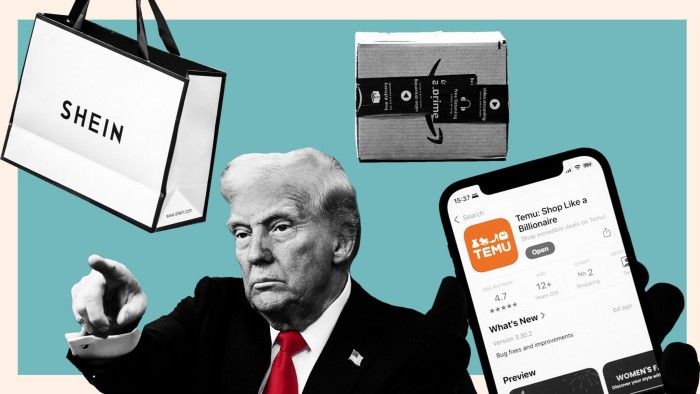Unlock the Editor’s Digest for free
Roula Khalaf, Editor of the FT, selects her favourite stories in this weekly newsletter.
Donald Trump’s crackdown on tariff-free access for small goods could threaten the business models of Chinese ecommerce groups Shein and Temu by raising their costs while benefiting Amazon, analysts said.
The US president imposed an additional 10 per cent tariff on Chinese imports over the weekend and said that the so-called de minimis rules exempting shipments under $800 from duties would no longer apply.
The US customs authority, on Monday, said its agents would now have to check and formally clear the contents of every mailed package from China. This could slow shipments and increase costs for companies whose US growth has been partly driven by efficient deliveries of cheap Chinese-produced goods.
“The impact is going to be much bigger than just . . . a few packages,” said Henry Gao, a law professor at Singapore Management University. “Everything from China is going to be held up because of this.”
Shein and rival Temu, which sell clothes and other items at low prices, have grown rapidly since the pandemic and were probably responsible for more than 30 per cent of the tariff-free shipments reaching the US under the regulations, a congressional report in 2023 said. According to US customs, about 4mn de minimis shipments are processed each day.
More than half of the de minimis shipments into the US originate from China. US Customs and Border Protection data showed that the average value of orders was about $50 with a total of $47.8bn in eligible goods shipped in the first three quarters of 2024.
Trump’s move comes just as Chinese companies are facing a backlash in western markets, with competitors saying they unfairly undercut them and regulators such as the EU alleging they ship substandard goods.
It is also bad news for Chinese suppliers to platforms such as Shein and Temu, who have become key customers and helped offset a drop in orders after their previous model of selling in bulk to big western buyers and trading firms was hit by the imposition of tariffs.
Executives at Shein, which is targeting a London listing with a valuation of about £50bn, have argued that its products would remain competitive due to its strategy of adjusting production volumes based on demand.
The scrapping of the exemption came as Trump also announced new tariffs on goods from Canada and Mexico. Those were put on hold after Trump spoke with the countries’ leaders. The tariffs on China came into effect on Tuesday and Trump is due to talk to Chinese leader Xi Jinping in the coming days.
US ecommerce company Amazon had sought to counter the threat posed by cheap Chinese suppliers by launching the “Haul” brand offering products for less than $20 with shipping times between one and two weeks. Now it may be able to avoid a “race to the bottom”, analysts said.

“Closing the loophole is favourable to Amazon,” said Andy Wu, an associate professor at Harvard, adding that the company “would preferably purchase in bulk . . . to get the most value out of its logistics system”.
The de minimis rules were designed to reduce the burden on customs officials by removing the need to inspect every small-value shipment, and allowed US businesses and consumers to avoid going through a lengthy customs process when buying less valuable items from abroad.
But they increasingly faced opposition, prompting former US President Joe Biden to propose a tightening of the rules for Chinese imports late last year, while the EU has proposed scrapping exemptions on packages worth less than €150, the Financial Times has reported.
Andrew Wilson, deputy secretary-general for policy at the International Chamber of Commerce, said removing the de minimis threshold was more likely to hurt smaller businesses rather than companies such as Shein and Temu.
“They [Shein and Temu] will accelerate their moves towards what essentially is the Amazon model of having warehouses in the US . . . There may be some impact on profitability and costs which may get passed [on to] consumers, but they will be big enough and will have sufficient resources to [mitigate it].”
Temu, which is owned by PDD Group, last year began recruiting Chinese suppliers who hold goods in warehouses in the US and asking existing suppliers to take on shipping, warehousing and last-mile delivery costs themselves. Shein has expanded its logistics network in the US and sought to diversify its production to Brazil, Turkey and India.
Sheng Lu, an assistant professor at the University of Delaware, said policy uncertainty was a bigger problem than the tariffs as large retailers could “evolve their business model”.
“Higher tariffs will increase the sourcing or operational cost,” he said. “But a bigger concern is uncertainty. You can really feel it at this point.”
Additional reporting by Eleanor Olcott and Laura Onita


